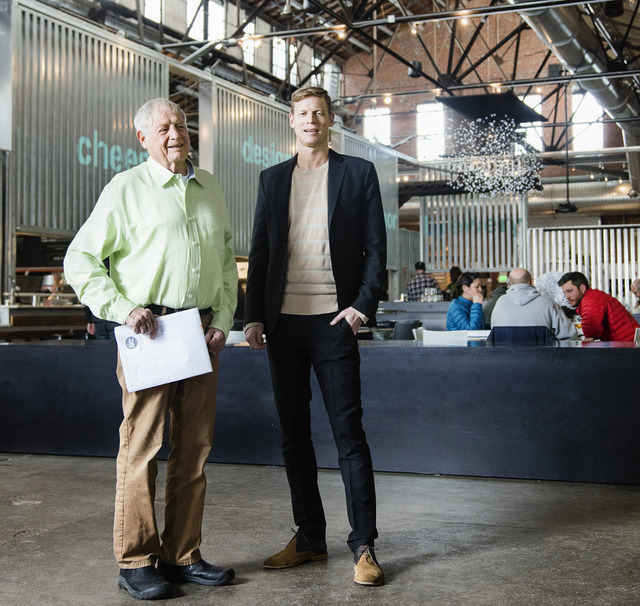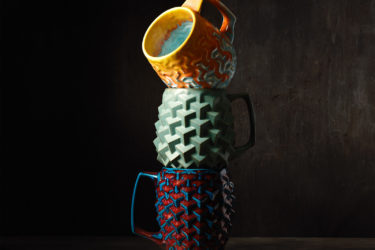The Local newsletter is your free, daily guide to life in Colorado. For locals, by locals.
In the more than 15 years they’ve worked together as the father-son team behind Zeppelin Development, Mickey Zeppelin has only fired his now 43-year-old son, Kyle, twice—or maybe three times.
“Kyle was a rebel from the beginning,” laughs Mickey, 78, who founded Zeppelin Development in the 1970s and recalls relieving Kyle of a dishwashing job the teenager had at the firm’s first restaurant. But as an adult in the early 2000s, Kyle channeled his rebellious streak (a family trait) to help inspire the company’s visionary development of Denver’s then-undiscovered River North (RiNo) neighborhood—and it’s worked for both of them ever since, as the firm has continued to create some of the Mile High City’s most interesting buildings.
Fifteen years ago, the Zeppelins began transforming the former Yellow Cab dispatch headquarters along the South Platte River into Taxi, a forward-thinking campus filled with office space for creative companies where the focus was as much on community as commerce. If this sounds like something from the cult of the new office—think Galvanize and Industry, today—it is. (At the groundbreaking ceremony for Taxi II, the Zeppelins didn’t shovel dirt; they burned cubicles.) But it was also 2001, when the concept of the new workplace was little more than a zygote in the development world. “That’s one of Mickey’s strengths,” says Kyle of his father. “He looks at what other developers are doing, and then does the opposite.” Eventually, the Zeppelins would add eight more buildings to the Ringsby Court site, which now includes a cafe, an early childhood education center, and residences.
Then, in 2013, the team debuted the Source, an eclectic food and drink market inside a carefully restored 19th-century foundry, which will be joined next year by the Source Hotel. The property, designed by Denver’s Dynia Architects, will house a rooftop pool lounge with a drink menu bolstered by New Belgium beers, many of which will be barrel-aged on-site. And its pedigree includes management by the folks who brought you the St Julien in Boulder. It will be the first new hotel in RiNo in, well, forever, and will perhaps be the biggest test of the Zeppelins’ golden touch.

To say the Zeppelins’ vision in RiNo has been prophetic is a bit like saying Colorado has some pretty hills. It’s also nothing new: The family has had a hand in shaping much of modern Denver’s growth since the 1970s. That’s when Mickey (gladly) gave up his law career to start working with his father developing real estate. In 1984, four years before LoDo became an official historic district, Mickey opened the City Spirit Café in what was then a rather downtrodden part of downtown. “I liked the energy, the people part of it,” Mickey says. “I like to find urban areas that have not found their time.” (Next on his radar, says Mickey, is Globeville.)
Mickey’s ability to find neighborhoods on the cusp of revitalization before others has led him all over the city. In 1992, he transformed an old warehouse at 14th and Wazee streets into the Volker Lofts, one of the first residential buildings in LoDo. From there it was on to the Golden Triangle, where Mickey planted the Cadillac Lofts and Grand Cherokee mixed-use project in the late 1990s. By the time Mickey was working on the Greenhouse building in Cherry Creek in 2001, Kyle had finished law school, and the younger Zeppelin began finding tenants for the light-filled residences. “He had a real skill,” says Mickey, who was so confident in his son’s ability to run things that he left the business in his hands for two weeks. “When I came back, the staff was gone. He’d fired them!” The only thing Kyle hated more than bad design was inefficiency. He’d seen a lot of the latter at his father’s office and decided to fix it.
“That’s one of Mickey’s strengths. He looks at what other developers are doing, and then does the opposite.”
Kyle brought that same determination to be both bold and efficient to Zeppelin Development’s RiNo projects. He and Mickey have repurposed all kinds of materials in their contemporary buildings—tempered hockey-glass panels from the Pepsi Center, bowling lanes, plastic bottles. (Mickey says it’s in the genes; his father worked in salvage.) Kyle spent months interviewing potential tenants for the Source, wanting to ensure the first-of-its-kind-for-Denver gathering spot had the right mix of high-quality purveyors. “We wanted to create a new version of what existed on Main Street 100 years ago,” Kyle says. Today the Source houses Acorn, one of the city’s best restaurants; leaders in beer (Crooked Stave), bread (Babettes Artisan Bakery), and coffee (Boxcar Roasters); and more. Similar models are now popping up in other parts of the city: Union Station in LoDo, Avanti in LoHi, and the coming-soon Stanley Marketplace in Stapleton. And the Zeppelins are being equally as thoughtful about the tenants who will share space with the upcoming Source Hotel: Kyle has secured a barbecue joint by the owners of Western Daughters Butcher Shoppe.
The one constant throughout all their projects is a commitment to social change—be it creating a new kind of workplace, helping an old industrial neighborhood find its sweet spot again, or simply providing a place for people to gather, eat, and have an experience, not just a meal, together. Of course, “social change” might sound to some like “gentrification.” But that’s not how Mickey would describe it. “The basic atom of development with a lot of our buildings is that we look at what people’s needs are and where they aren’t being met,” Mickey says. “Then we design around that.” The city will be watching to see if the Zeppelins’ vision for a RiNo hotel keeps their streak alive.










